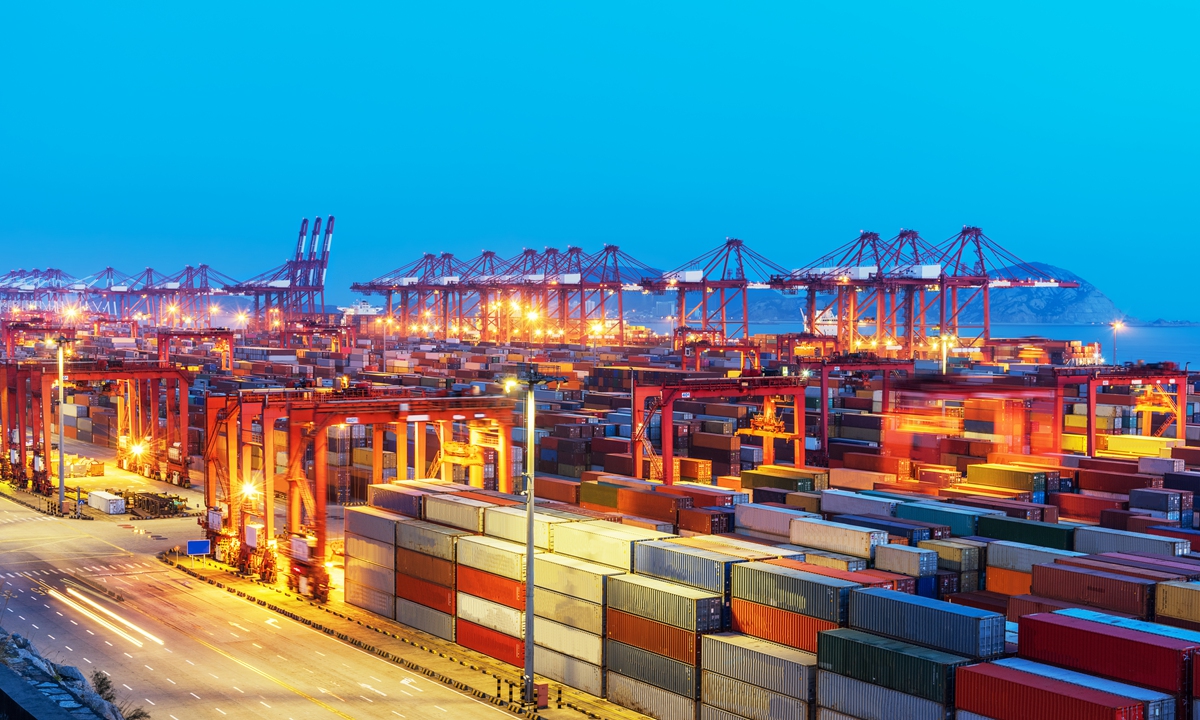Shanghai, world's largest trading hub, goes all out to minimize disruptions to trade flows

A container terminal of Yangshan Port in Shanghai Photo: VCG
Shanghai, which is home to the world's largest container port by throughput, remains resilient and unshakeable in securing international trade flows, despite the booming pressure from its ongoing tough battle against a serious wave of COVID-19 infections.Shanghai is facing the most severe and complex challenge of the epidemic since the normalization of prevention and control, according to Shanghai health authorities. The local government and domestic and foreign companies are beefing up efforts to ensure smooth transportation in and out of the city to ensure trade logistics while preventing infections.
The tense epidemic situation has put many on alert as international businesses are closely watching how the new flare-ups and anti-epidemic measures impact international supply chains, which are making a slow recovery from the global pandemic and port congestions.
In a statement to the Global Times on Wednesday, international shipping giant Maersk said that "local depots, warehouses [including Maersk's wholly owned OceanEast warehouse in Lingang area] and trucking services have been impacted due to the lockdown and we expect landside transportation efficiency will be reduced."
Maersk estimates in its latest notice that "trucking service in and out of Shanghai will be severely impacted by 30 percent due to a full lockdown on Shanghai's Pudong and Puxi areas in turn until April 5."
According to data from Clarksons, there are 90-95 containerships queuing and operating in Shanghai Port, with a total of over 400,000 standard containers, an increase of about 20 percent compared with the same period in 2021.
Cargo flights have also encountered a certain impact, with some international flight service providers having adjusted their schedules.
Cargolux, a Luxembourg-based flag carrier cargo airline, has reportedly said that it will suspend Shanghai Pudong International Airport flights until at least April 2. Other airlines are also watching and may adjust flight schedules "at the last minute and without prior notice," Haiyunwang, an industry information outlet, said on Wednesday.
While some transportation service providers are adapting to the changing situation in response to epidemic prevention needs, the general logistics operation and the supply chain remains resilient, as businesses are confident with high recognition of the local government's efforts in keeping the supply chain smooth.
Maersk told the Global Times that "Chinese authorities have voiced their determination to keep supply chains moving, as shown in the approach to keep ports and terminals operational."
A container transportation service firm at a port in Shanghai told the Global Times that the channel for container trucks to leave Shanghai is basically open, and trucks can be sent to other places via Pudong with an assignment book and a 48-hour nucleic acid test result.
DHL's North Asia hub at Pudong International Airport has launched a business continuity plan, the Global Times learned.
With the strong support of local customs, airports and epidemic prevention departments, DHL Express has actively coordinated its own fleet to add air capacity and organized employees to stick to their positions under closed-loop management to meet demand, the company told the Global Times.
FedEx is also working actively with the government in ensuring trade flows and epidemic prevention.
To accommodate the latest requirements regarding COVID-19 control measures in Shanghai, the company has made network and service adjustments. While strictly implementing epidemic prevention and control measures, FedEx continues to provide the best service possible to customers in Shanghai and surrounding areas, according to the company.
While there has been no substantive impact on ship loading and unloading, except some drop of land transportation efficiency for epidemic prevention needs, the situation remains critical, experts said, especially as cases in the region are still being found.
Zhao Nan, a research fellow at the Shanghai International Shipping Research Center, told the Global Times on Wednesday that the Shanghai port is still operating but under special closed-off management.
"With the rising flare-ups and strict but necessary epidemic controls, the local economy and consumption activities are expected to feel a certain hit, which may be reflected in the container throughput of the port in March," Zhao said.



